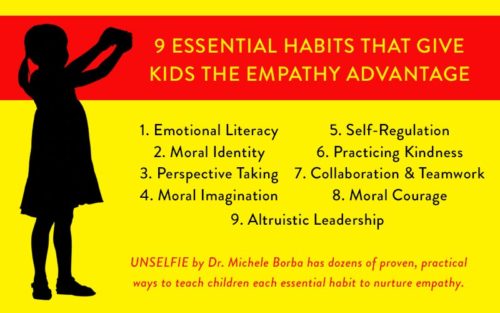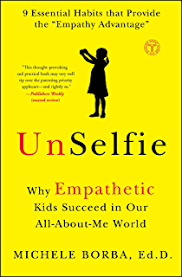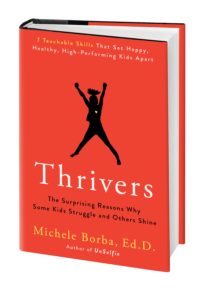Did you know that empathetic children share nine habits that they developed? Here are the 9 habits of empathetic children. I hope you join me to create an #UnSelfie Revolution so we raise kids with empathy, moral conviction and courage.
Most writers admit that there is one moment where a book started to gel. Mine was at the United States Air Force Academy where I was speaking to the faculty and cadets about character development. It was there that a young cadet asked me the question of a lifetime.
“Dr. Borba, I know that character is diminishing,” the nineteen-year-old began, “but chances are I will lead my troops into battle. I want to be sure that I’ll be an ethical warrior and do what’s right for them.” And then he paused and asked: “So what does research say that helps people keep their empathy open in times of stress? You know, what habits did Nelson Mandela or Mother Theresa learn to stay strong and think of others?”
I must admit I’ve never been asked such a powerful question, but I ensured him I’d find the answer. And so began a five-year search of reading hundreds of biographies on Nobel Peace Prize Winners, altruistic rescuers and Carnegie Medal winners. And I discovered the answer. The majority of the noble of heart said that they learned habits that helped increase their courage and moral conviction as well as activate their empathy in challenging times. And in most cases it was a parent or a teacher who helped them.
In my research journey, I also culled the science and interviewed top researchers and I identified nine habits that highly empathetic individuals use. These same habits are also essential for enhancing social-emotional competencies, resilience, academic success, leadership, healthy relationships, moral courage, happiness and mental health.
What’s more, all the habits of empathy are teachable, and don’t require costly programs, tutors or apps.
I’m convinced that these habits are essential to help our children thrive in today’s Brave New World and they are sadly often-overlooked in our parenting and educational agendas. The result: a dismal 40 percent dip in American teen empathy in the 30 years, and rise of what I call “the Selfie Syndrome.”
These nine teachable empathy habits form the blueprint to helping children acquire “The Empathy Advantage” that I describe in my book, UnSelfie: Why Empathetic Kids Succeed in Our All-About-Me World. Each chapter in UnSelfie offers dozens of simple, practical, proven ways to nurture those habits so children Develop, Practice, and finally Live Empathetically. Here are the nine habits and just a few simple ways to tune them up.

9 Habits of Empathetic Kids
DEVELOPING EMPATHY
Empathy Habit 1: Emotional Literacy
Teaching emotion literacy as the gateway to empathy so children can recognize and understand the feelings and needs of others in their body language, voice tone or facial expressions, Chapter 1.
Face-to-face instant is the best way kids learn to read emotions and develop empathy. Don’t let digital devices rob your kids of connecting with your family or classroom interactions. Set unplugged, digital times and then stick to them!
Kids also need an emotional vocabulary to discuss emotions and guidance for using it to become emotionally literate. Did you know that parents discuss, explain, and encourage daughters to share feelings far more than they do their sons? Talk emotions to your sons. Just find natural ways to point out feelings in everyday conversations.
Empathy Habit 2: Moral Identity
Helping children develop ethical codes and caring mindsets so they are more likely to adopt caring values that guide their integrity and activate their empathy to feel with and help others, Chapter 2.
Share your beliefs! Parents who raise kids with strong Moral Identities don’t do so by accident. They ensure that their children know what their family stands for. State your values again and again, so youth children understandings the “why” behind your beliefs.
Be a role model of integrity. What you do in those ordinary moments may be powerful images for your children to deposit in his identity bank.
Empathy Habit 3. Perspective Taking
Stretching perspective taking abilities and Theory of Mind so children can step into others’ shoes to understand another person’s feelings, thoughts, and views, Chapter 3.
Look for occasions to draw attention to people’s feelings, and then ask your child to guess what the person might need in order to change his mood. And stretch your child’s perspective using in everyday moments. Here are three simple ways:
In the news: “That girl won the spelling bee. How do you think she feels?” In books: “Take the bears’ side. How would you feel if Goldilocks used your beds and chairs without asking?” On TV: “The cyclone destroyed most of the children’s homes. What do you think those kids are feelings and thinking?”
Empathy Habit 4. Moral Imagination
Using elevating, emotionally-charged images in literature, film, news and images as a source of inspiration to help children become more empathetic, Chapter 4.
UnSelfie offers countless ways to use books to help children journey into the world of another. One quick idea is to check the teacher’s website for your child’s required reading list (or look at the bottom of his backpack!), and then get two copies of each school reading requirement: one for you and one for your kid. Though you each read the book alone, the experience creates discussions, opportunities to share your thoughts and hear your child’s views!
PRACTICING EMPATHY
Empathy Habit 5. Self-Regulation
Helping children learn ways to manage strong emotions and reduce personal distress to keep their empathy open, avoid the Empathy Gap and be more likely empathize and to help others, Chapter 5.
UnSelfie offers many ways to help kids learn to calm down but key is practicing the strategy together until your child can use it alone.
One simple tip is to teach “Belly Breathing.” Sit straight in a chair or lie flat on the floor with hands low on belly. Inhale deeply through your nose, gently hold it, and then let the air out slowly through your lips.
Empathy Habit 6. Practicing Kindness
Developing and exercising kindness and pro-social behaviors to increase children’s concern about the welfare and feelings of others and enhance the likelihood that they will step in to help, support or comfort others, Chapter 6.
Look for simple ways for your child to see you extend kindness: offering your seat on the bus to an elderly person, phoning your friend who is down, asking somehow how she is feeling. Just be sure to tell your child how good it made you feel! The more kids witness or experience what it feels like to be a “Kindness Giver” the more likely they will incorporate the virtue as part of their character.
Empathy Habit 7. Collaboration
Cultivating teamwork and collaborative abilities to help kids work with others to achieve shared goals for the benefit of all and develop a WE, not ME mindset, Chapter 7.
Encourage your child to have contact with individuals of different races, cultures, ages, genders, abilities, and beliefs in school, after school, or at summer camp. Make sure you display an openness that is positive to diversity so that your kids model how you respect differences.
Help your child notice what he has in common with others, not how he is different. Your child: “Those kids have dark skin.” Your question: “So how are you alike? Your child: “Well, they go to our church and play guitar like me.”
LIVING EMPAYHY
Empathy Habit 8. Moral Courage
Promoting moral courage and teaching children Upstander skills and situational awareness to embolden them to speak out, step in, and help others, Chapter 8.
Many kids assume they need to look like the Incredible Hulk to be courageous. Dispel that myth by sharing stories with your kids of people who changed the world with their quiet, nonphysical courageous acts. Here are three ideas to share with kids from UnSelfie:
Pee Wee Reese (the white player who stood up for his black teammate, Jackie Robinson, and stopped the jeering crowd with his quiet compassion.
Mahatma Gandhi, the leader of nonviolent civil disobedience was painfully shy as a boy and “could not bear to talk to anybody,” so he ran home after school every day.”
Rosa Parks, the African American civil rights activist who refused to give up her seat to white passengers, was described as “soft-spoken…timid and shy.”
Empathy Habit 9. Altruistic Leadership Abilities
Cultivating altruistic leadership abilities to motivate children to make a difference for others, no matter how small it may be and boost their chances of becoming Social Changemakers, Chapter 9.
A child who sees herself as altruistic is more likely to help others, because children act in ways that match their self-image. Help your child see herself as a help by praising her efforts. “You are such a helper! Thank you for taking time to help your friend pick up things from his backpack. He was so worried about being late to class.”
What are you doing to cultivate the 9 empathy habits?
I will describe each habit more thoroughly in upcoming blogs as well as proven benefits for nurturing them in our children. UnSelfie provides over 300 strategies educators and parents can use to help children acquire these nine vital habits.
Empathy can be cultivated in our youth and doing so will dramatically enhance their success, happiness and well-being. It’s why we must address both sides of the report card. Here are four questions to consider:
 1.Which empathy habits are you helping your children acquire?
1.Which empathy habits are you helping your children acquire?
2. Which empathy habits might you be overlooking?
3. Which empathy habits is your school addressing or may be overlooking?
4. Which habit are you interested in nurturing in your children or students?
I’d love to hear your ideas! Here’s to a generation of caring, committed, courageous, and successful children!
UnSelfie: Why Empathetic Kids Succeed in Our All-About-Me World is packed with research and strategies that we can use to raise good people.I hope you join me in starting an #UnSelfieRevolution to put empathy, kindness, caring, and courage back on our child-rearing an educational and parenting agendas.
And, coming March 2 is my new book called THRIVERS: The Surprising Reasons Why Some Kids Struggle and Others Shine. It’s everything we need to know as to how to raise mentally and morally strong kids who can both thrive now and later!
 Follow me on twitter: @micheleborba, Facebook: and my blog, Dr. Borba’s Reality Check where I’ll give you proven practices to produce a generation of strong, caring kids.
Follow me on twitter: @micheleborba, Facebook: and my blog, Dr. Borba’s Reality Check where I’ll give you proven practices to produce a generation of strong, caring kids.
More ways to create an #UnSelfieRevolution:
Empathy Is a Verb: My TEDx Talk to Start An UnSelfie Revolution
8 Practices That Raise Caring, Empathetic Kids
6 Simple Ways Children Can Spread Kindness in Schools
3 Horrific Things Violent Social Media Teaches Kids
54 Tips About Empathy to Raise Kids Who Think WE, Not ME (PART II )
95 Ways to Raise Kids To Think WE, Not ME (Part I)
42 Ways to Raise a Kind Child
Why Kids Need More Empathy – My Answer to TIME
5 Ways to Nurture Empathy in A Digital-Driven World
6 Ways to Nurture Kids’ Empathy and Boost Emotional IQ
7 Way to Help Sensitive Kids Keep Empathy Open


